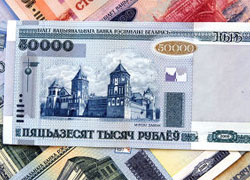The Wall Street Journal: Russia Refuses To Bail Out Belarus
67- The Wall Street Journal
- 12.05.2011, 8:53

Cash-strapped Belarus may receive only $1 billion in aid this year to help shore up its dwindling foreign reserves, a top Russian official said Wednesday.
The smaller-than-expected amount suggests the two countries may not have reached an agreement regarding the sale of key Belarussian assets, and throws into doubt whether authoritarian president Alexander Lukashenko will be able to stabilize his teetering economy.
The two countries had initially discussed a loan of $2.7 billion, which was to be paid this year. Instead, Russia and a Moscow-led bailout fund for former Soviet states will give Minsk a total of $3 billion, but the money will come over the next three years, with the first third of the sum being delivered in 2011, Russian Finance Minister Alexei Kudrin said.
Kudrin also suggested Belarus turn to other sources for cash.
"Belarus should privatize state property. Other countries may be interested," Kudrin said. "Belarus also understands it may need to contact the International Monetary Fund." Kudrin said the final details of the deal will be finalized within a week.
Russia has been eager to buy a stake in Beltransgas, a state-owned company that ships Russian gas to Europe. Officials in Belarus said last month the sale of a stake in the company--which is already 50% owned by Russia's Gazprom--was possible. Analysts said the lower than expected aid amount may be due to Lukashenko refusing to, in the end, part with the key state asset.
"Russia may be a little tired of Lukashenko's promises on privatization, which never seem to be very serious in the end," said Julia Tseplaeva, chief economist at BNP Paribas in Moscow. "Ultimately, this is not an ideal turn of events for Lukashenko."
The Belarussian president has called his country "an island of peace and stability" and provided the population with a generous social-safety net while keeping an iron grip on politics. But those same social policies--initiated during last year's presidential campaign--have drained the country's foreign exchange reserves by 25% since Jan. 1 and left it with a gaping trade deficit.
Turning to the IMF may be difficult for the increasingly-isolated Lukashenko. A brutal crackdown on opposition protests during the elections led Western countries to impose sanctions on Belarus and a travel ban on Lukashenko and other top government officials. Belarus completed an IMF program in 2009, when it secured a $2.9 billion loan from the organization.
Belarus has taken steps to stabilize its financial situation. The country's central bank said Wednesday it will allow retail cash exchange points to use a market rate, rather than fixed rates. Previously, exchange points were only allowed to trade foreign currency near the official rate of 3,061 rubles per dollar, while a free floating rate for companies allowed for trading at around 5,000 rubles per dollar.
The discrepancy in rates has led to a shortage of foreign currency at exchange points and banks. Fearing a formal devaluation of the currency--which both Russia and the IMF have said would be a necessary step in stabilizing Belarus' financial situation--residents have started stocking up on staples such as vegetable oil and sugar.
Belarus Wednesday raised its refinancing rate by 100 basis points to 14%, another step advocated by the IMF.
And carrying out additional reforms may be difficult for Lukashenko, analysts said.
"Lukashenko is not a reformer. He is right now interested in holding onto power and conserving the status quo," Tseplaeva said.









